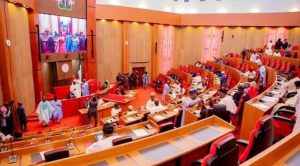
The Nigerian Senate is urging the Federal Government to increase funding for the country’s universities in the 2025 budget, aiming to tackle the growing issues in higher education, especially the brain drain of lecturers and lack of resources in public universities.
During a recent session, senators expressed concern about the condition of Nigerian universities, highlighting how many skilled lecturers are leaving the country for better opportunities abroad.
Senator Anthony Okorie pointed out the seriousness of this trend, saying, “Brain drain has become more alarming due to the economic challenges in the country. This is a major issue that threatens the future of our higher education system.”
Senator Ekong Samson added that losing talented academics to other countries could harm Nigeria’s long-term growth. “We are losing our brightest minds to the outside world. No country can thrive without a strong focus on education,” Samson stated.
Background This debate follows a 14-day ultimatum issued by the Academic Staff Union of Universities (ASUU) to the Federal Government, demanding urgent action on various unresolved issues. One of the main points is the renegotiation of the 2009 FGN/ASUU Agreement, based on recommendations from the Nimi Briggs Committee in 2021.
ASUU is also calling for the release of unpaid salaries from the 2022 strike and increased funding for public universities.
ASUU President, Emmanuel Osodeke, has previously criticized the government for neglecting these issues, warning that the public university system is at risk of further crisis. “These unresolved matters are pushing our university system toward more instability,” Osodeke said, voicing frustration over the government’s inaction.
Senate’s Response to the Crisis In response, the Senate adopted several resolutions, with Senate President Godswill Akpabio calling for immediate action. “We urge the Federal Government to increase funding for public universities in the 2025 budget to address these challenges,” Akpabio said.
The Senate also emphasized the need for major reforms in the university system, especially in terms of funding, governance, and salary structures. Lawmakers believe these changes will not only resolve the ongoing labor issues but also help reduce brain drain and restore confidence in the higher education sector.
Key Takeaways ASUU’s 14-day ultimatum, which started on September 23, 2024, focuses on several critical issues. These include implementing the 2021 Nimi Briggs Committee’s Draft Agreement, releasing salaries withheld from the 2022 strike, and increasing funding to revitalize public universities.
ASUU is also advocating for the adoption of the University Transparency and Accountability Solution (UTAS) to replace the current Integrated Payroll and Personnel Information System (IPPIS), which they claim has caused various payroll issues.
The union is demanding payment for outstanding third-party deductions, such as check-off dues and cooperative contributions, which have been delayed. If the government fails to address these concerns within the given timeframe, ASUU has warned that they may resume industrial action, further disrupting academic activities nationwide.

